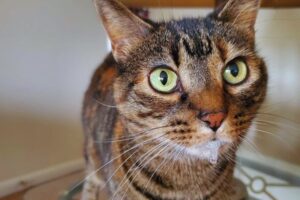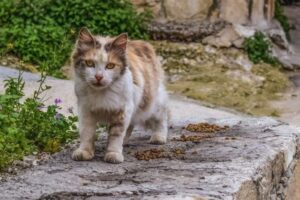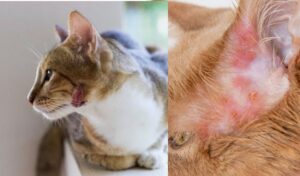It might be alarming for a pet owner to see that their cat has started foaming at the mouth right away. If the cat has recently received a vaccination, the first thing that comes to mind is rabies, which might increase anxiety and uncertainty. There are various potential reasons for a cat foaming at the mouth, but only a licensed veterinarian can determine the precise cause after doing a thorough medical examination of your cat. The cat’s owner was concerned when it began to froth at the mouth, especially if it happened suddenly.
Why is My Cat Foaming at the Mouth?

first of all, You will be glad to know that I am also a pet lover. I have 18 cats in my house. Most of them are Persian. So as a pet lover you know what they mean to us. In the last past few years, They are growing with me and I do my best for their good health and a good life. I Always care about them. I studied about them. Now I am a good owner of them because I know what is best for them!
So, you can trust me. I always communicate with my personal vet. I visit her with my pets regularly. I wrote in consultation with her about cat foaming at mouth.
As you can’t take your cat to the vet right now, I am telling you all the reasons. If your cat is ok now, then you just read on and remind and be careful of all the things!
Nausea

Cats can experience nausea after receiving the vaccine. This is a good sign that your cat’s body has responded well and should be able to fight off this illness on its own, but if it doesn’t then you will need to take them in for treatment and this is a common incident of a cat foaming at mouth!
The feline family is not immune to feeling nauseated. Just like humans, cats can be pregnant and diabetic, which makes them more susceptible to experiencing motion sickness or being sick with gastritis-linked symptoms of nausea, including fatigue loss and appetite issues as well!
Bitter Tasting Substances
Common causes of this include oral medications and eye drugs. A bitter taste may also come from atropine, which is often used to treat narrowing in an animal’s eyes or for other respiratory issues like asthma. It can cause a cat foaming at the mouth when given into one Eye drop therapy. Different types that produce a bitter flavor include Flagyl (Metronidazole), Benadryl OTC antihistamine drug prescribed by veterinarians againstquitaineHSI.
Ask your vet about getting the prescription compounded if taking a drug that has a bitter taste causes problems for you as well as your cat. The flavor of the drug can be improved through the process of compounding, making it more likely that your cat will take it willingly.
Toxicity
Cats are so cute, but they can also be very vulnerable. The list of potential toxins that may harm your fluffy friend is long and includes everything from pyrethrins to snail bait–it even. Includes plants! If you notice any additional symptoms like confusion or vomiting after giving them food with an unusual ingredient (like catnip), then take note because those signs might mean one thing. Your kitty has eaten something harmful and is intent on harming him/herself; it might be the reason of a cat foaming at the mouth. Seek emergency veterinary care immediately if needed.
Spot on Flea Treatments
Topical flea treatments for dogs often contain the insecticides pyrethrin and permethrin, both of which are toxic to cats. Please seek emergency veterinarian attention if you suspect your cat has consumed or been exposed topically to a popular dog product. This could take them down a painful path to death!
Seizures

Seizers can be the reason for a cat foaming at the mouth. While the seizure disorder is less common in cats than in dogs, it can still happen. A sudden burst of electrical activity within your cat’s brain could lead to various signs such as twitching or paddling muscles and losing control over bodily functions like urination/defecation (amongst others).
A cat will trip over and fall on the ground, briefly lose consciousness, tremble and shake violently, and probably begin to foam at the mouth.
You should schedule a vet visit if your cat displays signs of a seizure disorder.
The good news is that there are drugs that can treat cat epileptic seizures and lessen the recurrence of seizures.
Related Article: “Are Bengal Cats Hypoallergenic? – What Experts Say!”
Dental Problems

Your cat may be experiencing pain and discomfort if he/she has an oral infection. This is because the teeth can become inflamed, which causes them to decrease in size or even break off due to excessive inflammation. The vet will tell you what steps need taken soonest so that this doesn’t happen again!
If your cat has gingivitis or fractures a tooth, they may froth at the mouth as the dental problems increase. Many vets advocate cleaning your cat’s teeth.
If cleaning your cat’s teeth appears too harsh and you fear dental infection, schedule a veterinarian exam straight once. There is nothing to be afraid of because of dental problems, cat foaming at the mouth is a common problem.
Mouth difficulties include a shattered tooth, gum disease, and stomatitis. Loss of appetite, bad breath, and oral pain are dental symptoms.
Rabies

Rhabdovirus infection is a deadly virus. Mouth foaming is a symptom of the latter stages of this illness. Most cats in the United States have been vaccinated against rabies. Therefore the disease is extremely uncommon; likewise, rabies does not occur in Canada or the United Kingdom.
As a pet owner, you’ve probably heard of rabies, so when you see your cat foaming at the mouth, you think it has rabies.
Rabies is a risk if your cat has been introduced to other animals, but vaccination makes it unlikely.
Since mouth-foaming occurs late in rabies, your cat would’ve been ill for some time.
Rabies can also induce behavioral abnormalities, aggressiveness, and drooling.
Anxiety

It’s possible that there isn’t even a physical cause for your cat’s mouth foaming. Yes, cats can be sad.
When you see your cat foaming at the mouth, this may be caused to anxiety issues, trouble interacting with other dogs, an encounter with just an unknown animal, or relocation.
Extremely anxious cats may pace, become hyper-vigilant, shake, brush themselves excessively, and foam at the mouth.
Determining the reason for their worry might be difficult.
Relax, Anxiety medicines are available.
Viral Infections
So you’re wondering if your cat has rabies? Well, the answer is no. Though it’s rare for a vaccinated animal to develop this terrible disease, there are still other viruses out in circulation that can cause excessive drooling or foam in their mouth, such as calicivirus, which causes upper respiratory symptoms similar to those found during an ordinary cold snap!
Cats are being poisoned
This is the scariest explanation for a foaming-at-the-mouth cat besides rabies. Obviously, poisoning requires immediate veterinary treatment. Directly administered or mistakenly swallowed flea treatments can cause cats to froth at the mouth.
Bitter-tasting foods and drugs can also cause a cat foaming at the mouth.
Your cat may have accidentally taken poison by eating a toxic frog or getting into home items, so you shouldn’t blame your unfriendly neighbor.
Your cat can recover from poisoned with urgent veterinarian care.
Blood dripping from the lips of a cat
Your cat’s saliva may include blood, which can be a cause for alarm if you observe him drooling or frothing at the mouth. A tooth infection or stomatitis is the most common cause of bleeding in the mouth. Another possibility is that the cat has a bleeding wound in its mouth. Regardless, if you notice any blood on your cat, you should take it to the veterinarian immediately.
What to do if your Cat is Foaming at Mouth
Besides severe cat foaming at the mouth and drooling, other signs and behaviors are expected. A little drool here and there is probably nothing to worry about. Still, if your cat is acting agitated, not eating, vomiting or showing any other signs of health problems, you should take him to the vet immediately. A veterinarian can help you choose the best course of treatment for drooling, as there are several possibilities. Drooling may be caused by a variety of factors, including the cat’s medical history, its interaction with other animals, and the presence of potentially harmful chemicals in its environment.
Cats with dental illnesses may need to get their teeth cleaned by a vet. The removal of a tooth may be necessary for circumstances of serious dental disease.
As soon as you notice your cat’s mouth is foaming due to toxin intake, you should bring a sample of the material to the vet. Your cat may be given charcoal to absorb poisons in the stomach if poisoning is suspected. Additional IV fluids can help your cat recover after ingesting toxins.
Veterinarians may request blood and x-rays if they believe that your pet has a respiratory illness. To prevent the transmission of the disease, your veterinarian will also want to know if your cat has lately been in touch with other cats. Antibiotics and restorative fluids may be used to prevent or treat subsequent bacterial infections. Upper respiratory viral infections can be treated with a combination of rest, diet, and oxygen treatment.
Prevention of Cat’s Mouth Foaming
If you’re a conscientious cat owner, you can avoid numerous health-related problems with foaming at the mouth. Don’t intentionally terrify or agitate your cat; don’t allow others to do the same. When you see your cat foaming at the mouth, it’s serious dude. Prevent fear and anxiety in your cat by providing a loving and safe environment.
Common dental disorders may appear as your cat ages. Cleaning your pet’s teeth on a regular basis, whether on a yearly or semi-annual basis, is essential for their oral health. Brushing your cat’s teeth and gums on a regular basis can help maintain their mouths clean between hygiene appointments. Toothpaste designed for humans is dangerous if consumed. Therefore never use it on animals. Your cat’s mouth will be less prone to plaque and germs if you feed it natural cat chow that contains a lot of water.
Always use a drug designed exclusively for cats when providing an anti-flea or anti-tick treatment. Cats may be poisoned by formulas formulated for dogs because of the more significant quantities. While most topical drugs are applied on the neck below the head, be careful of excessive grooming if you have numerous cats or perhaps a dog you are treating.
Cost of Foaming at the Mouth in Cats
When you see your cat foaming at the mouth, you can’t ignore the expenses of treatment. The cost of treatment is going to change based on what’s causing your cat’s foaming at the mouth in the first place.
For instance, the cost of treatment protocols for anxiety and fear-related drooling can be approximately $150, but the cost of therapies might be around $850 if your cat is found with a dental problem. On the other hand, the typical price tag for severe cat foaming from the mouth and drooling is close to $350.
When Should I See a Vet?
If you see your cat foaming at the mouth, it’s best to get it checked out by a vet right away. These are only a few examples:
- A stray dog or cat is biting or scratching your cat.
- Any toxic substances, such as laundry detergent, drain opener, human antidepressant, onion and garlic or any dangerous home plants that she may have taken.
- She may have fallen, lost consciousness, or is shaking violently as a result of some sort of neurological issue, which is why she is acting this way.
Contact your veterinarian right away if you see any of the warning signals listed above. He or she will conduct the appropriate tests and begin administering the prescribed medicine.
If you know that your cat’s mouth is foaming due to a minor problem, you may just keep a watch on her. Her symptoms will improve as soon as her body is able to clear itself of the toxins that caused them. You should also offer your cat extra affection and give her your full attention if you believe she is suffering from emotional discomfort. This will put her more at ease.
Diagnosis
Your cat will undergo a thorough medical examination by the veterinarian, and you will be questioned about its past medical history. You will be questioned about whether or not the cat has ingested something that it shouldn’t have, as well as whether or not there are any preexisting medical concerns.
Your veterinarian will be able to get an overall picture of your cat’s health, including how the organs are performing, from the biochemical profile, complete blood count, and urinalysis that are performed on your pet. It’s possible that more diagnostics will be required depending on the circumstances. After all that, he/she will tell you why your cat is foaming at the mouth and what to do now.
FAQ
Rabies in Cats: How Long Does It Take Before Anyone Notices?
Really, I don’t know. Cats often begin showing signs of rabies three to eight weeks after they’ve been infected, but in some cases, signs may not begin until a year later. As the disease progresses, mouth-foaming is a common sign.
What Objects Around the Home Could Be Harmful to Cats?
Cats are poisoned by a variety of everyday home products. Here are a few typical examples:
Onions and garlic, Grapes and raisins, Coffee, caffeine, and alcohol, Mothballs, Cleaners, Cannabis, Medications, Tobacco products, Pesticides, and herbicides. One thing more, Keep your cat away from insects, especially baby roach.
Cats swallowing household chemicals, such as bleach and laundry detergent, may experience vomiting and foaming of the mouth. These everyday household items should be kept away from kids and pets.
After Taking Medication, My Cat’s Mouth Is Foaming. What’s Going on?
When a cat is given medication, it is normal to begin foaming at the mouth because of the taste or trouble swallowing. The allergic response isn’t always the case.
What can you do for basic first aid in your own home?
As long as you are confident that your cat has not been exposed to a poison or a dangerous animal, you can provide them with water and food. Contact your veterinarian immediately if your cat’s condition worsens or if you notice any other sickness symptoms.
Conclusion
Cat Foaming at the mouth isn’t always rabies. It’s rare. If your cat has the flu or a virus, don’t panic. Still, obtain medical help. Mouth foaming may be induced by salivary gland irritation, a bacterial infection, stress, or sadness. Fortunately, your cat can recover. So don’t worry. Just remind all things you read here. Don’t ignore any sign of your cat.

